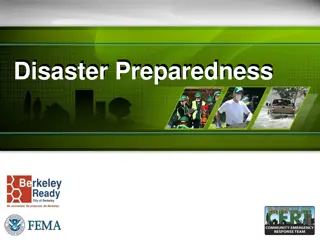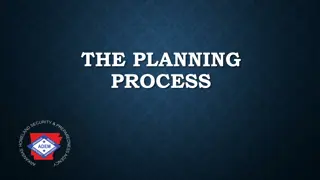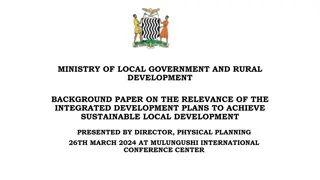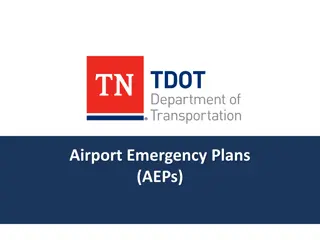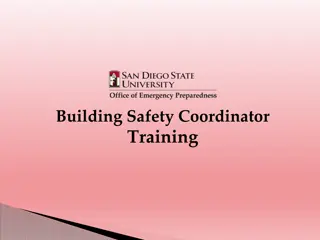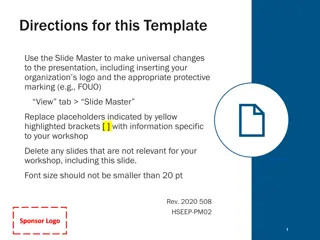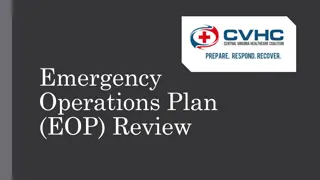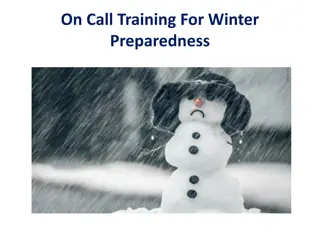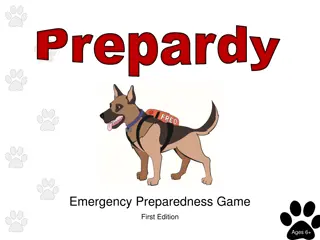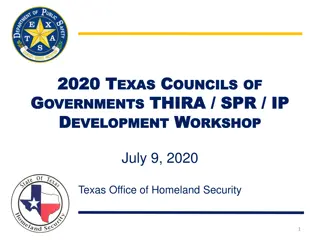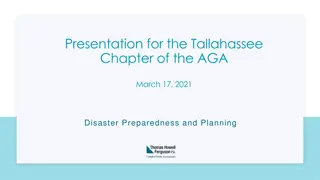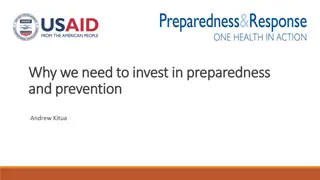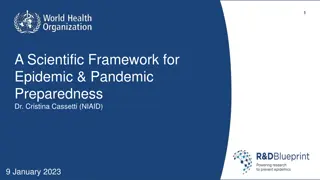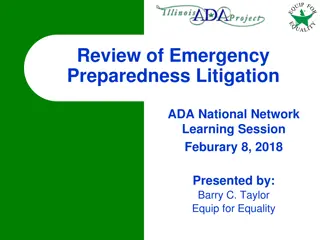Integrated Preparedness Planning Workshop Overview
The Integrated Preparedness Planning Workshop provides a comprehensive approach to documenting preparedness priorities and activities for organizations or jurisdictions. By utilizing the Integrated Preparedness Cycle, efficiency in utilizing resources, time, and funding is maximized, contributing to enhancing capabilities and overall preparedness. Attendees are expected to actively participate, bring knowledge of current activities, and have authority to commit resources.
Download Presentation

Please find below an Image/Link to download the presentation.
The content on the website is provided AS IS for your information and personal use only. It may not be sold, licensed, or shared on other websites without obtaining consent from the author. Download presentation by click this link. If you encounter any issues during the download, it is possible that the publisher has removed the file from their server.
E N D
Presentation Transcript
Directions for this Template Use the Slide Master to make universal changes to the presentation, including inserting your organization s logo and the appropriate protective marking (e.g., FOUO) View tab > Slide Master Replace placeholders indicated by yellow highlighted brackets [ ] [ ] with information specific to your workshop Delete any slides that are not relevant for your workshop, including this slide. Font size should not be smaller than 20 pt Rev. 2020 508 HSEEP-PM02 Sponsor Logo Sponsor Logo 1
Integrated Preparedness Planning Workshop (IPPW) [Sponsor Jurisdiction/Organization] [Date] Sponsor Logo Sponsor Logo
Welcome and Introductions [Name] [Jurisdiction/Organization] Sponsor Logo Sponsor Logo 3
Agenda [Time] Integrated Preparedness Overview [Time] Review of Prior Integrated Preparedness Plan [Time] Identify Preparedness Priority Factors [Time] Establish Preparedness Priorities [Time] Develop a Multi-year Schedule [Time] Establish Program Reporting [Time] Review [Time] Next Steps [Time] Closing Remarks Sponsor Logo Sponsor Logo 4
Attendee Expectations Have a working knowledge of their jurisdiction s/organization s capabilities, threats and hazards, and other priority factors Working Knowledge Bring a list of their jurisdiction s/organization s currently scheduled preparedness activities Bring a List Authority to Commit Have authority to commit personnel and resources to the activities scheduled in the Integrated Preparedness Plan Actively Participate Actively participate in workshop discussions as a representative for their jurisdiction/organization Sponsor Logo Sponsor Logo 5
Integrated Preparedness Overview The purpose of the Integrated Preparedness Plan (IPP) is to document overall preparedness priorities and activities for [jurisdiction/organization]. Incorporating all elements of the Integrated Preparedness Cycle allows for maximum efficiency of resources, time, and funding. This works towards improving [jurisdiction/organization] capabilities. Sponsor Logo Sponsor Logo Sponsor Logo 6
Integrated Preparedness Overview Utilizing the Integrated Preparedness Cycle when developing the Integrated Preparedness Plan, provides a jurisdiction/organization a continuous and reliable approach for examining the progress of improvement toward the ability to prepare for, respond to, recover from, and mitigate the threats, hazards, and risks most relevant to the jurisdiction/organization. Sponsor Logo Sponsor Logo 7
IPPW Purpose The purpose of the IPPW is to consider the range of preparedness activities within the Integrated Preparedness Cycle, and along with the guidance provided by senior leaders, identify and set preparedness priorities, and schedule preparedness activities for the multi-year Integrated Preparedness Plan. Sponsor Logo Sponsor Logo 8
Review of Prior Integrated Preparedness Plan (IPP) [Insert highlights from the previous multi-year IPP and an update on the progress toward the preparedness priorities and the multi-year schedule] Sponsor Logo Sponsor Logo 9
Workshop Activities (1/2) The IPPW focuses on primary activities and The IPPW focuses on primary activities and associated tasks. associated tasks. Identify Preparedness Priority Factors: Identify Preparedness Priority Factors: Identify threats, hazards, and risks Identify validated and non-validated areas for improvement and capability assessments Identify external sources and requirements Identify accreditation standards or regulations Establish Preparedness Priorities Establish Preparedness Priorities Sponsor Logo Sponsor Logo 10
Workshop Activities (2/2) Develop a Multi Develop a Multi- -Year Schedule Identify planning elements Identify organization and equipment elements Identify training opportunities Identify potential exercises Build multi-year schedule Year Schedule Establish Program Reporting Establish Program Reporting Sponsor Logo Sponsor Logo 11
Identify Preparedness Priority Factors Identifying the applicable factors affecting jurisdiction/organization is the key element to then setting preparedness priorities The list of factors is intended to help organizations consider the full range of factors impacting their preparedness activities for the coming multi-year schedule Sponsor Logo Sponsor Logo 12
Activity Overview During this activity, we will focus on the following tasks: Identify Threats, Hazards and Risks Identify Areas for Improvement and Capabilities Identify External Sources and Requirements Identify Accreditation Standards and Regulations Sponsor Logo Sponsor Logo 13
Identify Threats, Hazards, and Risks Objective: Objective: Identify any significant threats, hazards, and risks Consider: Consider: Jurisdiction/Organization threats and hazards THIRA or other local risk assessments Hazard vulnerability analysis National threats and hazards Instructions: Instructions: 1. Locate the other members of your jurisdiction/organization 2. As a group, develop a list of the top threats, hazards, and risks impacting your jurisdiction/organization 3. Record these threats, hazards, and risks 4. Choose a group member to brief the findings Sponsor Logo Sponsor Logo 14
Identify Areas for Improvement and Capabilities Assessments Instructions: Instructions: Objective: Objective: Identify areas for improvement and assess current capabilities 1. Locate the other members of your jurisdiction/organization Consider: Consider: Previous areas for improvement and capability assessments identified Prioritized corrective actions Newly acquired capabilities and resources Completed corrective actions validated Strengths shared 2. As a group, develop a list of your jurisdiction s or organization s top strengths and areas for improvement 3. Record these strengths/areas for improvement 4. Choose a group member to brief the findings Sponsor Logo Sponsor Logo 15
Identify External Sources and Requirements Instructions: Instructions: 1. Locate the other members of your jurisdiction/organization 2. As a group, develop a list of your jurisdiction s/organization s key external sources and requirements 3. Record these sources and requirements 4. Choose a group member to brief the findings Objective: Objective: Identify any significant external sources and requirements Consider: Consider: Industry reports State or national preparedness reports Homeland security strategies Grants or funding-specific requirements Sponsor Logo Sponsor Logo 16
Identify Accreditation Standards and Regulations Instructions: Instructions: 1.Locate the other members of your jurisdiction/organization 2.As a group, develop a list of your jurisdiction s/organization s key accreditation standards and regulations 3.Record these standards and regulations 4.Choose a group member to brief the findings Objective: Objective: Identify any significant accreditation standards and regulations Consider: Consider: Accreditation requirements Local, state, and federal regulations Sponsor Logo Sponsor Logo 17
Establish Preparedness Priorities Preparedness priorities are the strategic, high-level priorities that guide overall preparedness activities These priorities should be comprehensive to meet the needs of the whole community and will drive preparedness activities through the Integrated Preparedness Cycle Sponsor Logo Sponsor Logo 18
Establish Exercise Program Priorities Instructions: Instructions: Objective: Objective: Achieve consensus on the priorities that will guide the preparedness activities for the next [#] years 1. Identify appropriate number of priorities on which to focus upcoming preparedness activities Consider: Consider: Factors identified in Activity 1 Senior Leaders guidance 2. Priorities should action orientated and measurable 3. Consider priorities from a holistic preparedness perspective Sponsor Logo Sponsor Logo 19
Develop a Multi-Year Schedule The multi-year schedule outlines the preparedness activities that will address the preparedness priorities identified in Activity 2. The purpose of this activity is to schedule and synchronize all aspects of preparedness within the Integrated Preparedness Cycle, not just training and exercises, in an effort to address capability gaps and improve overall preparedness. Sponsor Logo Sponsor Logo 20
Activity Overview During this activity, we will focus on the following tasks: Identify Organizational Structure Elements Identify Planning Elements Identify Equipment Elements Identify Training Opportunities Identify Potential Exercises Update and Build Multi-Year Schedule Sponsor Logo Sponsor Logo 21
Identify Planning Elements Objective: Objective: Identify planning activities affecting preparedness priorities Consider: Consider: Existing planning goals or deadlines Existing corrective actions to be integrated into plans Information needed on jurisdictional/organizational factors Training needed for existing plans, policies, procedures, and checklists Instructions Instructions: : 1. Locate the other members of your jurisdiction/organization 2. As a group, discuss what plans, policies, procedures, and checklists will be reviewed, updated, or written in the next [# of years] years 3. Record the results of the discussion 4. Choose a group member to brief the findings Sponsor Logo Sponsor Logo 22
Identify Organizational Structure Elements Objective: Objective: Identify organization activities affecting preparedness priorities Consider: Consider: New organizational structure changes, shortfalls, and limiting factors Upcoming budget, grants, retirements, staff turnover, long term vacancies Training needed to address organizational structure and capabilities changes Instructions: Instructions: 1. Locate the other members of your jurisdiction/organization 2. As a group, discuss jurisdiction/organization structure changes for the next [# of years] years 3. Record results of the discussion 4. Choose a group member to brief the findings Sponsor Logo Sponsor Logo 23
Identify Equipment Elements Instructions: Instructions: 1. Locate the other members of your jurisdiction/organization 2. As a group, discuss equipment changes for the next [# of years] years 3. Record results of the discussion 4. Choose a group member to brief the findings Objective: Objective: Identify equipment activities affecting preparedness priorities Consider: Consider: New equipment, shortfalls, and limiting factors Upcoming budget, grants, purchase approvals, Training needed to improve or introduce equipment capabilities Sponsor Logo Sponsor Logo 24
Identify Potential Training Objective: Objective: Identify potential training priorities and opportunities for inclusion in the multi-year schedule Consider: Consider: Current training capabilities and planned courses Jurisdictional/Organizational customized training Recurring training requirements Training needed to close gaps Training needs prior to exercises Training options available Instructions: Instructions: 1. Locate the other members of your jurisdiction/organization 2. As a group, identify potential training events 3. Record the potential training events, including the focus, audience, and date 4. Choose a group member to brief the findings Sponsor Logo Sponsor Logo 25
Identify Potential Exercises Objective: Objective: As a group, identify potential exercises for inclusion in the multi-year schedule Consider: Consider: What changes to plans, policies, procedures, and checklists need validating? What jurisdictions/organizations, departments, and teams need exercising and in what way? Does equipment usage need validating? What training is needed prior to exercising? Identify training. What previous corrective actions need to be validated? What types of exercises will meet needs? What is the goal or intended outcome of the chosen exercises? Instructions: Instructions: 1. Locate the other members of your jurisdiction/organization 2. As a group, identify potential exercises 3. Record the potential exercises events, including the focus, audience, and date 4. Choose a group member to brief the findings. Sponsor Logo Sponsor Logo 26
Update/Build the Multi-Year Schedule Objective: Objective: Update or build the multi- year schedule of preparedness activities Instructions: Instructions: 1. Populate planning activities identified 2. Select organize/equip activities identified to populate in the multi- year schedule 3. Select exercises from the proposed list and identify tentative exercise conduct dates 4. Select training events and identify tentative conduct dates, scheduling around planning, organize/equip, and exercises, as appropriate Consider: Consider: Preparedness factors identified in previous tasks (plan, organize/equip, train, exercise, and improve) Activities that promote collaboration Activities involving the Whole Community Sponsor Logo Sponsor Logo 27
Integrated Preparedness Schedule [Month 1] [Month 1] Activity Activity Priority Priority 1 1 Priority Priority 2 2 Priority Priority 3 3 Priority Priority 4 4 Priority Priority 5 5 Plan Organize Equip Train Exercise Example schedule only Sponsor Logo Sponsor Logo 28
Integrated Preparedness Schedule [Month 2] [Month 2] Activity Activity Priority Priority 1 1 Priority Priority 2 2 Priority Priority 3 3 Priority Priority 4 4 Priority Priority 5 5 Plan Organize Equip Train Exercise Example schedule only Sponsor Logo Sponsor Logo 29
Integrated Preparedness Schedule [Month 3] [Month 3] Activity Activity Priority Priority 1 1 Priority Priority 2 2 Priority Priority 3 3 Priority Priority 4 4 Priority Priority 5 5 Plan Organize Equip Train Exercise Example schedule only Sponsor Logo Sponsor Logo 30
Establish Program Reporting Include the jurisdiction s/organization s methodology for prioritizing, assigning, monitoring, tracking, and reporting the progress made toward resolution of issues identified during exercises and real- world incidents, as well as, capability improvement projects and the overall impact these actions have on capabilities. Sponsor Logo Sponsor Logo 31
Establish Program Reporting Consider: Consider: Compiling and recording areas for improvement from exercises and real-world incidents Determining actions and linking capabilities needed to address identified areas for improvement and associated corrective actions Prioritizing, assigning, tracking, reporting, and updating corrective actions progress Incorporating changes, completed corrective actions, identified potential best practices and lessons learned into future iterations of the Integrated Preparedness Cycle and IPP Sponsor Logo Sponsor Logo 32 32
Review Ensure proposed preparedness activities support and address the preparedness priorities. Collaborate and coordinate with stakeholders to reduce overlap and to share resources. Sponsor Logo Sponsor Logo 33
Next Steps Develop and distribute IPPW Summary Develop the IPP [insert additional items as needed] Sponsor Logo Sponsor Logo 34
Conclusion Sponsor Logo Sponsor Logo Sponsor Logo 35 35


